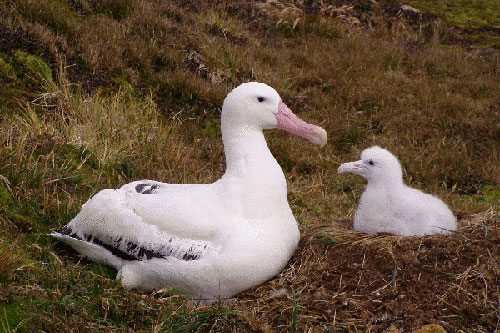Rémi Fay and colleagues (Centre d’Etudes Biologiques de Chizé, Villiers-en-Bois, France) have published in the Proceedings of the Royal Society B: Biological Sciences on the effects of male and female parental ageing on the performance of offspring in Wandering Albatrosses Diomedea exulans.
The paper’s abstract follows:
“Variability in demographic traits between individuals within populations has profound implications for both evolutionary processes and population dynamics. Parental effects as a source of non-genetic inheritance are important processes to consider to understand the causes of individual variation. In iteroparous species, parental age is known to influence strongly reproductive success and offspring quality, but consequences on an offspring fitness component after independence are much less studied. Based on 37 years longitudinal monitoring of a long-lived seabird, the wandering albatross, we investigate delayed effects of parental age on offspring fitness components. We provide evidence that parental age influences offspring performance beyond the age of independence. By distinguishing maternal and paternal age effects, we demonstrate that paternal age, but not maternal age, impacts negatively post-fledging offspring performance.”
Read a news article on the publication here.

A 29-year old male Wandering Albatross and its downy chick on Marion Island, April 2005, photograph by John Cooper
Reference:
Fay, R., Barbraud, C., Delord, K. & Weimerskirch, H. 2016. Paternal but not maternal age influences early-life performance of offspring in a long-lived seabird. Proceedings of the Royal Society B: Biological Sciences 283 (1828) DOI:10.1098/rspb.2015.2318.
John Cooper, ACAP Information Officer, 29 April 2016

 English
English  Français
Français  Español
Español